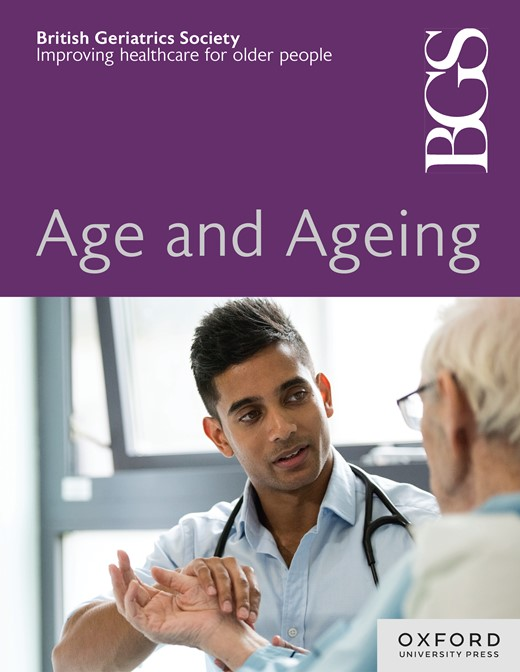3124 Rehabilitation after an episode of delirium: mixed methods process evaluation of the RecoverED multi-site feasibility study
IF 7.1
2区 医学
Q1 GERIATRICS & GERONTOLOGY
引用次数: 0
Abstract
Introduction A process evaluation was conducted alongside a multi-site feasibility trial of RecoverED, a multicomponent delirium rehabilitation intervention for older people in post-acute settings. Up to 10 sessions of the home-based intervention is delivered by a multidisciplinary healthcare team. A modified Conceptual Model for Implementation Fidelity was used. Findings on implementation and acceptability are presented. Design and Methods A mixed-methods design was employed, and participants included older adults with delirium, their carers, and trained healthcare professionals (HCPs) from six NHS hospitals in the UK. Adherence to content, dose, and coverage, as well as moderating factors such as recruitment, context, participant responsiveness, delivery quality, and intervention complexity, were assessed. Data included in-depth interviews, focus groups, trial documentation, and training, and supervision logs. Mixed-methods findings were triangulated. Results Nineteen participant-carer pairs were recruited. Five older people, 9 carers, and 8 HCPs were interviewed post-intervention. Seven HCPs participated in two focus groups. Evaluating adherence to content was complex since the intervention is person-centred and personalised. Psychosocial support was delivered more frequently than planned for each individual, while physical rehabilitation and functional recovery activities were delivered less than planned. The value of participant-led goals was emphasised, with high satisfaction, engagement, and perceived value. Implementation was according to the theorised delivery approach, and participants expressed positive views on the quality of delivery. While HCPs found the training comprehensive, they preferred a more interactive and practical format. Teams need to be specifically staffed and co-located for effective coordination and supervision of RecoverED. Most withdrawals (N = 10) were due to complex needs or impairments. No minority ethnic participants were recruited. Conclusion The RecoverED intervention was found to be acceptable; however, recruitment challenges suggest that acceptability and fidelity to dose and coverage should be interpreted with caution. Implementation fidelity to the delivery approach was high and well-perceived.3124谵妄发作后的康复:多地点康复可行性研究的混合方法过程评估
本研究进行了一个过程评估,同时进行了一个多地点的可行性试验,该试验是一种针对急性后环境中老年人的多成分谵妄康复干预。多学科医疗团队提供多达10次的家庭干预。采用了改进的实现保真度概念模型。提出了关于实施和可接受性的调查结果。设计和方法采用混合方法设计,参与者包括患有谵妄的老年人,他们的护理人员和来自英国六家NHS医院的训练有素的医疗保健专业人员(HCPs)。对内容、剂量和覆盖范围的依从性,以及招募、背景、参与者反应性、递送质量和干预复杂性等调节因素进行了评估。数据包括深度访谈、焦点小组、试验文件、培训和监督日志。混合方法的结果被三角化。结果共招募了19对参与者-监护人对。干预后对5名老年人、9名护理人员和8名卫生保健人员进行了访谈。七名医务人员参加了两个焦点小组。由于干预是以人为中心和个性化的,因此评估对内容的依从性是复杂的。为每个人提供的心理社会支持比计划的要频繁,而身体康复和功能恢复活动的提供比计划的要少。参与者主导的目标的价值被强调,具有高满意度、参与度和感知价值。执行工作是按照理论化的交付方法进行的,与会者对交付的质量表示积极的意见。虽然医护人员发现培训内容全面,但他们更喜欢更具互动性和实用性的形式。团队需要专门配备人员,并在同一地点工作,以便有效地协调和监督“恢复”。大多数退出(N = 10)是由于复杂的需求或损伤。没有少数民族参与者被招募。结论康复干预是可接受的;然而,招聘方面的挑战表明,应谨慎解释可接受性和对剂量和覆盖范围的忠诚。对交付方法的实现保真度很高,并且很容易理解。
本文章由计算机程序翻译,如有差异,请以英文原文为准。
求助全文
约1分钟内获得全文
求助全文
来源期刊

Age and ageing
医学-老年医学
CiteScore
9.20
自引率
6.00%
发文量
796
审稿时长
4-8 weeks
期刊介绍:
Age and Ageing is an international journal publishing refereed original articles and commissioned reviews on geriatric medicine and gerontology. Its range includes research on ageing and clinical, epidemiological, and psychological aspects of later life.
 求助内容:
求助内容: 应助结果提醒方式:
应助结果提醒方式:


